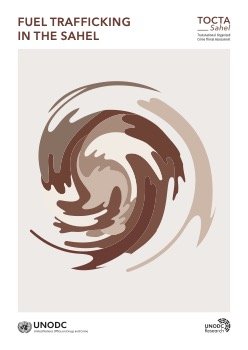By The United Office on Drugs and Crime
In the Sahel countries and their neighbours, the high prevalence of infectious diseases, including malaria, coupled with challenges in terms of the availability and affordability of and access to healthcare, creates an environment in which the demand for medical products and services is not fully met through formal channels. The disparity between the demand for and supply of regulated pharmaceutical products leaves room for trafficking, provides an incentive for the involvement of organized criminal groups and fuels the ongoing threat to public safety and public health in the Sahel countries. Between January 2017 and December 2021, at least 605 tons of different medical products were seized in West Africa during international operations. While there are no reliable estimates of the overall quantities of medical products that are trafficked in different ways and forms in the Sahel countries, studies point to a percentage of substandard and falsified medicines in the medical market of between 19 and 50 per cent. Some 40 per cent of the substandard and falsified medical products reported in the Sahel countries between 2013 and 2021 was discovered in the regulated supply chain. Just as regulated medical products can be diverted, illicitly manufactured medical products can find their way into authorized pharmaceutical outlets, which shows how much the regulated (legal) and unregulated (illicit) supply chains are interconnected. The Sahel countries rely heavily on imports of medical products because their pharmaceutical industries are still in the early stages of development. Of total pharmaceutical expenditure in sub-Saharan Africa in 2019, imports represented as much as 70 to 90 per cent (roughly 14 billion United States dollars ($)). Medical products diverted from the legal supply chain often originate in the main exporting countries of medical products to the Sahel countries, in particular Belgium and France, and to a lesser extent China and India. Others are manufactured in neighbouring countries, including in North Africa and the Gulf of Guinea. The seaports in the Gulf of Guinea, Conakry (Guinea), Tema (Ghana), Lomé (Togo), Cotonou (Benin) and Apapa (Nigeria) can be identified as major entry points for medical products destined for the Sahel countries. Trafficking by air, using postal shipments or carried out by commercial air passengers, is employed for smuggling smaller quantities of medical products. Once in West Africa, trafficked medical products reach the Sahel countries through smugglers who follow traditional trafficking routes using buses, trucks and private cars. Investigations have revealed the involvement of a wide range of opportunistic actors in trafficking in medical products in the Sahel countries, from employees of pharmaceutical companies, public officials, law enforcement officers and health agency workers to street vendors, all motivated by potential financial gain. Despite terrorist groups and non-state armed groups being commonly associated with trafficking in medical products in the Sahel, most reported cases in the region show that the involvement of such groups is limited and mainly revolves around consuming medical products or levying "taxes" on them in the areas under their control. In sub-Saharan Africa, as many as 267,000 deaths per year are linked to falsified and substandard antimalarial medicines. In addition, up to 169,271 are linked to falsified and substandard antibiotics used to treat severe pneumonia in children.
Vienna: UNODC, 2022. 28p.





